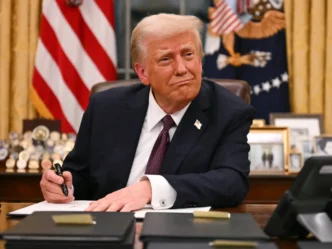The Biden-era framework for controlling the export of advanced AI chips is officially on the chopping block. In a move that signals a seismic shift in U.S. tech policy, the Trump AI chip policy reversal—announced this week—aims to simplify regulations and reshape how cutting-edge semiconductors flow across global markets.
Set to go into effect on May 15, 2025, the decision dismantles a complex three-tier export control system created by the Biden administration to limit access to AI chips based on geopolitical risk. According to the U.S. Commerce Department, the old rule was too bureaucratic and risked stifling American innovation.
“This is about freeing up American innovation,” a Commerce spokesperson told Reuters. “The Biden AI rule was overly complex and failed to serve U.S. interests.”
What the Biden Framework Was Designed to Do
The three-tier system, finalized in Biden’s final days in office, created a layered export control map:
- Tier 1: Seventeen allied countries, including Taiwan, had unlimited access to U.S. AI chips.
- Tier 2: Around 120 countries faced strict numerical caps on chip imports.
- Tier 3: Nations like China, Russia, Iran, and North Korea were completely blocked.
The goal was to allow access for trusted partners while preventing adversaries from acquiring AI technologies through intermediaries. But critics warned that the system was too rigid and difficult to implement—pushing potential partners toward competitors like China.
Sources familiar with the plan say the Trump administration is leaning toward a global licensing model. Under this approach, chip exports would be governed by inter-governmental agreements, offering more flexibility than the previous system while preserving controls over sensitive technologies.
The change comes as Trump prepares for a visit to the Middle East (May 13–16), where nations like the UAE and Saudi Arabia have expressed frustration over strict AI chip restrictions. Insiders suggest the UAE may be offered a new bilateral agreement that could mark the beginning of a broader licensing regime.
Saudi Arabia and the UAE have both positioned themselves as emerging AI hubs—and the UAE has pledged to invest $1.4 trillion in U.S. tech and infrastructure over the next decade. These stakes make AI chip access a key diplomatic bargaining chip.
Market Reaction and Industry Impact
News of the Trump AI chip policy shift sent markets moving. On May 7, Nvidia stock rose 3%, although it gave back some gains in after-hours trading. The company, a global leader in AI chips, has long criticized strict export controls, with CEO Jensen Huang warning that overregulation could cost U.S. firms dominance in the rapidly growing Chinese market.
Huang has projected China could become a $50 billion market for AI chips. However, Trump’s administration has shown it won’t back away entirely from export restrictions. In 2024, it banned Nvidia from selling its H20 chip to China—a move that reportedly led to $5.5 billion in writedowns.
Who Gains From the Policy Reversal?
Several nations stand to benefit from this reversal. Countries like India and Malaysia, which had no restrictions prior to Biden’s rule, now see temporary relief. Malaysia, in particular, may accelerate Oracle’s data center expansion, which would have violated Biden-era import limits.
In the Middle East, the UAE and Saudi Arabia may negotiate more favorable AI chip terms, allowing them to continue building national AI infrastructure. Trump’s upcoming visit could be the venue for announcing the first of several government-to-government chip deals.
While the tiered system will be scrapped starting May 15, the new control framework remains under development. The Trump administration is weighing whether to implement new export rules via regulation or executive order, according to Axios.
During the transition, existing export restrictions will remain in place. That includes scrutiny of chip diversion to China through third-party countries like Malaysia and Thailand. Sources suggest that tighter checks on those nations could be part of the new plan.
U.S. chipmakers like Nvidia have welcomed looser rules, but AI labs such as Anthropic continue to support tighter controls to protect U.S. intellectual property and technological leadership.
A New Balancing Act: Innovation vs. National Security
The Biden framework focused heavily on preventing Chinese firms from accessing advanced chips. But that emphasis came at a cost—frustrating allies and complicating trade for American tech giants.
Now, the Trump AI chip policy seeks to walk a different line: protecting national security while giving U.S. businesses more freedom to compete globally.
Crafting this balance won’t be easy. Replacing a standardized three-tier system with a flexible licensing model will require complex bilateral negotiations and tailored agreements for each partner country.
There’s still no clear timeline for when the new framework will be finalized or fully implemented. But one thing is certain: the U.S. is about to enter a new era of AI chip diplomacy, with deep implications for international trade, national security, and tech innovation.













